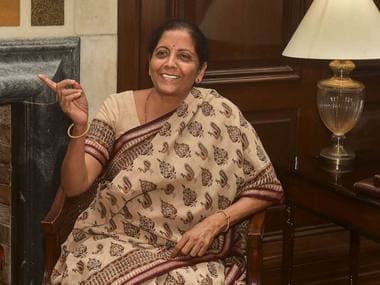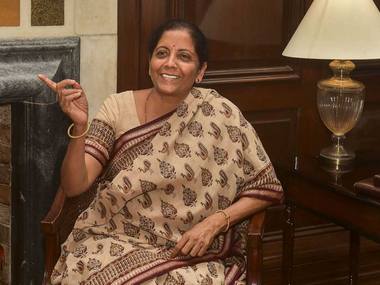The Goods and Services Tax (GST) is indeed a paradigm-changing legislation, but it is still a work in progress with petroleum products among others still out of its tentacles and purview. While GST collections hover around Rs 1 lakh crore a month, collections from petroleum products are a sizeable amount. During April-December 2018, the central excise collections were Rs 1.97 lakh crore on petroleum products. On an annualised basis, this translates to Rs 2.63 lakh crore. Add to this the local sales tax by state governments on petroleum products, which on an average can be taken as the same as the excise amount. That will make the total annual tax collections from petroleum products to a whopping Rs 5.26 lakh crore. [caption id=“attachment_6738991” align=“alignleft” width=“380”]  File image of Finance Minister Nirmala Sitharaman. Reuters.[/caption] Juxtaposed against annual GST collections of Rs 12 lakh crore, this translates to 44 percent of GST. The point is the new Finance Minister Nirmala Sitharaman must bring petroleum products under the GST ambit. With central excise and local sales tax accounting for roughly 50 percent of the petrol bunk prices, its migration to the GST regime brooks no delay if only to give a huge relief to the common man who is affected more by the stiff indirect taxes. To compensate for the resultant loss of revenue which the Narendra Modi government has been saying all along is ill-affordable given its social welfare commitments, it must drastically shake-up and overhaul the direct taxes regime as follows:
- Capital market should not be pampered in the name of encouraging the equity cult. As it is long term capital gains (LTCG) from bourses are taxed at a soft rate of 10 percent once it crosses the Rs 1 lakh exemption limit. There is no reason why it should not be taxed at the normal slab rates except that tax shelters must be made available at par with other LTCGs. Short term capital gains, too, should not be let off with a slap on the wrist—15 percent tax.
- Wealth tax should return to the tax fold. It was abolished in 2015. If anything it should be made more potent and net wealth—without any exemption in favor of any assets or class of assets—in excess of Rs 5 crore must be taxed at 3 percent.
- Estate duty has been in suspended animation since 1985 and must be revived, once again packing a greater punch. There is no reason why estate in excess of Rs 10 crore should not be taxed at 15 percent when many states in the US impose a stiff 50 percent tax on estate of the deceased on the ground that inheritors must be made to pay through their noses. Of late, the revival of estate duty has been in the air.
- There is no reason why the cap on deduction under section 80C should be a one-size-fits-all at Rs 1.50 lakh. The savings capacity varies from individual to individual, and this should neither be shackled nor straightjacketed. Let there be a sliding scale. First, Rs 1.50 lakh of savings/investments under section 80C, 100 percent deductible. Second, Rs 1.50 lakh 90 percent deductible, third Rs 1.50 lakh and 80 percent deductible and so on. After all most of the deductions under this section are for altruistic purposes and mostly benefits government schemes. The nation can do with a lot of capital formation.
- DDT or dividend distribution tax should go. It is patently inequitable. It vicariously imposes a soft impost on the rich, namely company promoters, even after considering the 10 percent tax payable by shareholders on dividend received in excess of Rs 10 lakh even while condemning a widow and retired person otherwise not required to pay income tax to the same vicarious tax. One can expect the return of normal tax on dividend. Indeed, the NDA has not been comfortable with the idea of DDA with the then finance minister Yashwant Sinha abolishing it.
- The then finance minister Arun Jaitley through Budget 2018 increased the lock-in period for investments in bonds under Section 54EC to five years from three years even while reducing the holding period of residential property from three years to two years so as to make the grade as long-term capital asset. This was inappropriate. People buy houses for retaining them for a sufficiently long period of time. So, if anything, the holding period ought to have been increased from three to five years so as to discourage speculation in housing. And the holding period for reinvestment of the long-term capital gains from residential properties should not have been increased to five years from three. People sell their houses to finance the education of their wards as well as to marry off their daughters. It is cruel to tie up their funds in illiquid bonds carrying a meager rate of interest—5.75 percent per annum. So, if anything, the holding period of bonds should have been reduced from three to two years.
(The author is a senior columnist and tweets @smurlidharan) Follow full coverage of Union Budget 2019-20 here


)

)
)
)
)
)
)
)
)



